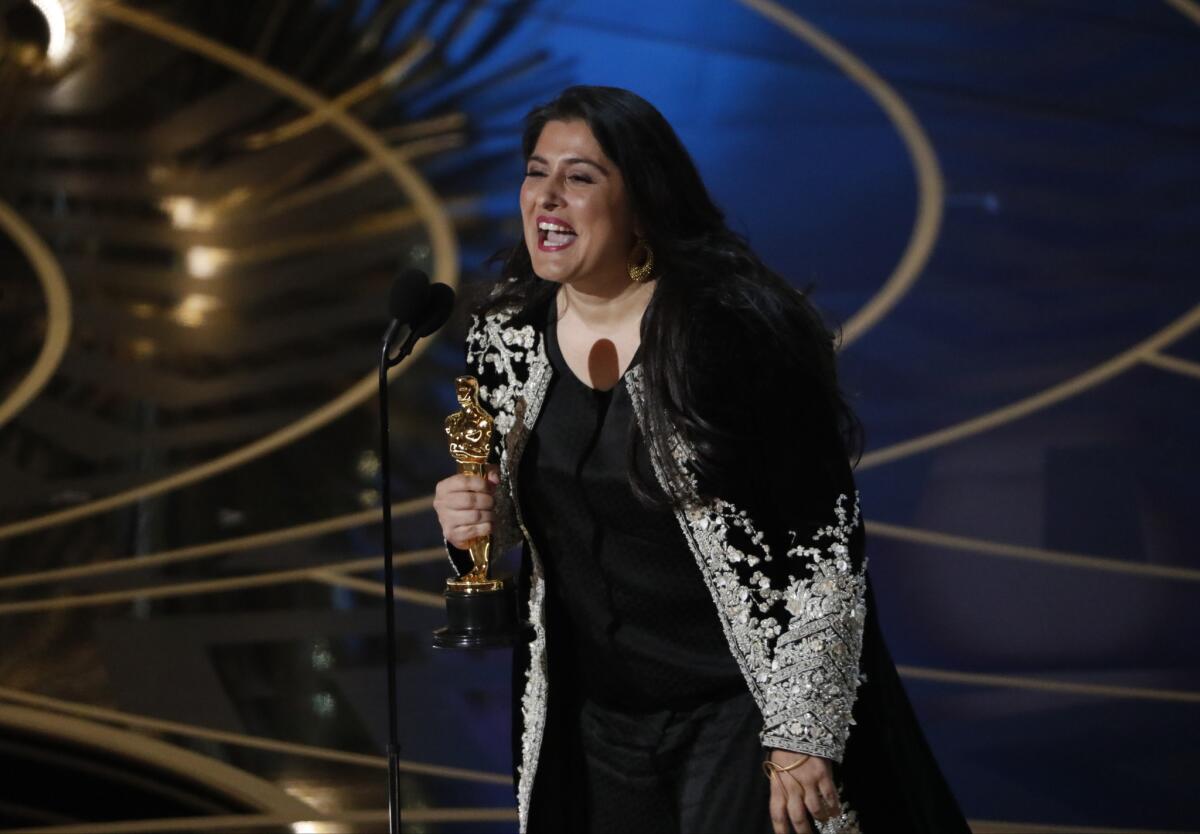This Oscar-winning movie has Pakistan vowing to protect women against ‘honor killings’

- Share via
reporting from Mumbai, India — A Pakistani filmmaker’s second Oscar victory prompted celebration in her home country Monday and renewed the spotlight on so-called honor killings, which claim thousands of women’s lives every year in the South Asian nation.
Honor killings are deeply embedded in South Asian culture, where arranged marriages are common and tradition subjugates women to the sometimes lethal authority of their male relatives.
The government has pushed to hold some of the perpetrators accountable, and on Monday, two brothers were sentenced to death in the eastern city of Lahore for killing their sister and her husband after they married against the family’s will.
But filmmaker Sharmeen Obaid-Chinoy’s Oscar-winning documentary, “A Girl in the River: The Price of Forgiveness,” has inspired new efforts to crack down on the deadly custom. Pakistani Prime Minister Nawaz Sharif held a screening of the film at his official residence last week, the first time it was shown in Pakistan, and promised new government help in eradicating the practice.
“Women like Ms. Sharmeen Obaid-Chinoy are not only a pride for the Pakistani nation but are also a significant source of contribution toward the march of civilization in the world,” Sharif said in a statement after Sunday night’s Oscar ceremony.
But the power of film, and of international pressure, has its limits.
Obaid-Chinoy’s documentary, which won in the short-subject documentary category, traces the story of Saba Qaiser, a teenage girl whose father shot her in the head and dumped her in a river for marrying a man her family didn’t approve of.
Qaiser survived the attack and sought justice, a rare story in Pakistan, where women and girls — and a small number of men — believed to have shamed their families are killed despite legislation outlawing the practice.
Loopholes exist in Pakistani law under which survivors can “forgive” their assailants — often husbands, fathers and brothers — and allow them to escape serious punishment. In the end, that’s what happened in Qaiser’s case: Tribal leaders put pressure on her to pardon her father and uncle for attacking her.
Ultimately, her husband’s older brother persuaded Qaiser to forgive them — “We have to live in the same neighborhood,” he said — and they were set free.
Her father’s defense was that he did the right thing, and that it would serve as a warning to his other daughters not to defy his wishes.
“After this incident, everyone says I am more respected,” her father says in the film. “I can proudly say that for generations to come none of my descendants will ever think of doing what Saba did.”
Many perpetrators are not charged in the first place, especially in rural, tribal areas where police may turn a blind eye.
The Human Rights Commission of Pakistan documented nearly 500 deaths in honor killings last year, although advocacy groups believe that thousands of cases go unreported annually.
After the film’s Oscar win, Sharif said in a statement that “there is no place for killing in the name of honor in Islam,” and vowed legislation “to stop such brutal and inhumane acts.”
In her acceptance speech, Obaid-Chinoy drew applause when she said, “This is what happens when determined women get together.”
“This week the Pakistani prime minister has said that he will change the law on honor killing after watching this film,” she said. “That is the power of film.”
One step that Pakistani lawmakers could take immediately would be to revive a bill that eliminates the loopholes for those who perpetrate honor killings. The measure stalled in Pakistan’s parliament last year.
But even with that, deep-seated cultural attitudes that sanction such violence persists in many parts of Pakistan.
Pakistan’s rapidly urbanizing society has afforded women many more opportunities, but has not completely eroded traditional beliefs. In a 2013 Pew Research Center poll of Pakistanis, 84% of respondents said Islamic religious law should be the law of the land, and of that percentage nearly 9 in 10 favored stoning as a punishment for adultery.
“The voices that speak out against honor killings are a minority. The great majority of society is quite apathetic,” writer Bina Shah said in an interview. “There is a culture of male supremacy in this society and it’s taken for granted that men will dominate women. Chauvinistic people interpret this as women being the property of men.”
The 2014 Nobel Peace Prize went in part to Malala Yousafzai, the Pakistani teenager who was shot in the face for advocating education for girls — but while she has received global acclaim, she has not yet been able to return to Pakistan, much less turn around conservative attitudes about schooling.
Like Yousafzai, Obaid-Chinoy has been criticized in some quarters for spreading negative stories about Pakistan to a global audience. The filmmaker faced such a reaction for “Saving Face,” a previous documentary about victims of acid attacks in Pakistan, which won an Oscar in 2012.
“A Girl in the River” is due to air on HBO in March.
Special correspondent Aoun Sahi in Islamabad, Pakistan, contributed to this report.
Follow @SBengali on Twitter for more news from South Asia
ALSO
Chris Rock handled the Oscars diversity issue as only Chris Rock could
Chris Rock’s hot mess of an Oscars show: powerful, confounding, possibly revolutionary
Leonardo DiCaprio ties his work in ‘The Revenant’ to a greater cause -- fighting climate change
More to Read
Sign up for Essential California
The most important California stories and recommendations in your inbox every morning.
You may occasionally receive promotional content from the Los Angeles Times.











